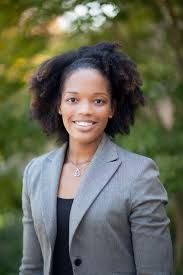
The rich diversity of research and perspectives found in UC San Diego's Department of Computer Science and Engineering makes it the thriving, supportive and world-class community it is today. Read about one of our members, Angelique Taylor ’21, and the impact of CSE on her present and future.
Angelique is a PhD student in the Healthcare Robotics Lab working with Professor Laurel Riek. Her research lies at the intersection of computer vision, robotics, and artificial intelligence. She’s working to design algorithms that enable robots to interact with groups of people in real-world environments.
1) Why did you choose CSE?
I started my PhD at the University of Notre Dame because I wanted to work with Dr. Laurel Riek, my advisor, in the Healthcare, Communications, and Robotics lab. After my first year in the PhD, she invited me to move UC San Diego to continue working with her. I accepted her invitation because UC San Diego was starting a Contextual Robotics Institute where multidisciplinary researchers come together to build community, collaborate, and work with local robotics companies. This seemed like the perfect opportunity to gain exposure to the robotics field.
2) Who has influenced or guided you the most? And how?
Laurel Riek has guided me the most throughout my PhD. She has taught me the ins and out of my research field and she has provided me many opportunities to meet and network with top researchers in my field.
3) Can you talk about the impact of the research and projects you’ve been able to be part of at CSE?
It’s a good time to be at UC San Diego because we just started the Contextual Robotics Institute, directed by Professor Henrik Christensen, and there’s a lot of work being done in soft robotics and surgical robotics. Laurel Riek is actually working to build robots from scratch to help older adults stay in their homes longer.
We are actually trying to design technology that will help people, working to make people’s lives easier and better. And for me, that’s what’s most valuable about it. I feel like the work that I’m doing is actually moving towards something that will be put into people’s homes, be put into hospitals, be put in these different public spaces where people will find them useful.
Learn more about Angelique and her research in this video.
4) You’ve won some impressive awards and recognitions, including a recent Microsoft Research Dissertation grant. How did CSE help you achieve those successes?
CSE afforded me the opportunity to collaborate with local clinical institutions to help shape my research agenda.
*Angelique received one of the 2019 Microsoft Research Dissertation Grants for her work to investigate ways to help robots work more effectively with people. The grants provide up to $25,000 and offer recipients the opportunity to attend Microsoft’s Ph.D. Summit at Microsoft Research headquarters in Redmond, Washington.
She and fellow PhD student Alyssa Kubota, former postdoc Hee Rin Lee and PI Laurel Riek recently received a best paper honorable mention at the ACM Conference on Computer Supported Collaborative Work for Coordinating Clinical Teams: Using Robots to Empower Nurses to Stop the Line.
Angelique is also the recipient of the National Science Foundation Graduate Research Fellowship, Arthur J. Schmitt Presidential Fellowship, GEM National Consortium, Google Anita Borg Memorial Scholarship, National Center for Women in IT and the Grace Hopper Celebration of Women in Computing Scholarship.
5) How do you think CSE will help shape or influence you in the future
CSE has provided a community for me which I intend to foster beyond my time at UC San Diego
Learn more about what makes CSE a special place in this video.

